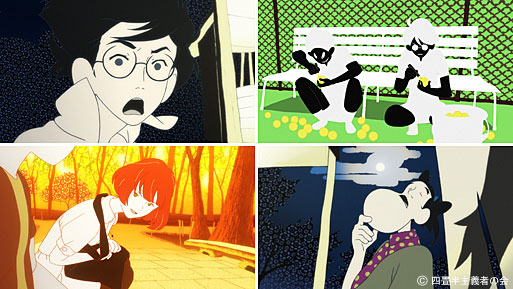So you’re sitting in your abnormal psych class and they start talking about depression… Or maybe not. Maybe you’re a Wikipedia junkie, and are obsessively wondering whether or not it’s ruining your life when you realize (OF COURSE) that wikipedia can answer that! So you stumble upon the psychology term “rumination.” And you think to yourself, yeah, no, I can see how nearly obsessively replaying things you’re not happy with in your mind is not good for your mental health. But why would that make you depressed, exactly? What does it all mean?
BEHOLD, my friends, Yojouhan Shinwa Takei, which FUNimation has dubbed as The Tatami Galaxy. BTW, there is no excuse for not beholding it, since FUNimation has made it free to watch on their website, youtube, and Hulu.
As you can tell, the animation is different from the usual look and feel of anime, which I appreciated. Apparently I’m not the only one, since it won the Grand Prize at the Japan Media Arts Festival, the first television program to do so and in part to its interesting visuals. The music for the opening and ending are also catchy as all get out. I wasn’t an instant fan, but by the time I had finished the series I couldn’t drive them from my head (in the good way).
The story follows the protagonist, who remains nameless, as he ruminates about his college life. ORLY, you say? You’re really telling me this is good entertainment?
YA, RLY! I reply. I know you wouldn’t think so, but DOODE. Chillax and check it out. The first reason: it’s not just some wanker angsting in his bedroom. The main character actually lives out his college life in the first episode, and he comes across some colorful and interesting characters, but because of them and his own personality, things just don’t end up like he was expecting (and usually in a way that is fun and entertaining for us spectators). He is dissatisfied, and thinks to himself, if only I had done something different, had joined a different group of people, etc. So at the end of the episode everything rewinds and he does exactly that. And for each of the next nine or so the show follows him as he repeatedly rewinds and strives for his “rose colored campus life.”
How is this rumination, you say, and not just a re-do of Groundhogs Day? I’ll admit it is sorta similar in premise and conclusion, and can get a little repetitive feeling in the middle, but I urge you to keep on! Because the payoff at the end of the show, for me, was epic awesome. In comparison, Groundhogs Day was trite and waxing sentimental dribble. Over the course you can see the protagonist growing more and more desperate, willing to throw himself to extravagant and complicated lengths to have his perfect life, while the world around him is filled with imperfect people acting like people, and therefore thwarting him. But in the end, he retreats into himself, loosing his desire for a rose colored campus life and giving up on the world altogether. And this is where it struck me that it was a beautiful example of rumination. The show makes the mental path rumination can follow into a literal path, exploring the futility and consequences of it. The character relived – literally instead of only mentally – experiences in his life he wasn’t satisfied with. Clinical depression is often characterized by losing interests in the goals in your life, withdrawing away from social situations, and lethargy–all played out by the protagonist when he chooses a world that is only his 4 1/2 tatami room. And ultimately, the message was that you have to learn to accept yourself and your past and move on from them to get out of your rut, to break free from that which confines you. Just like psychological studies have shown for rumination.
So I say to you: Watch The Tatami Galaxy. It’s free, so why the fuck not? And think about yourself and your life!

